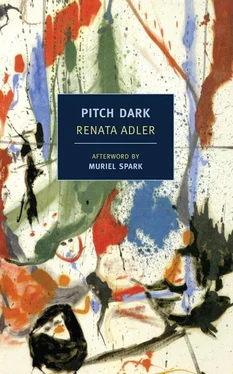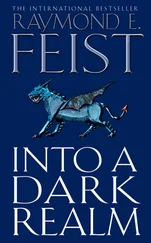Renata Adler - Pitch Dark
Здесь есть возможность читать онлайн «Renata Adler - Pitch Dark» весь текст электронной книги совершенно бесплатно (целиком полную версию без сокращений). В некоторых случаях можно слушать аудио, скачать через торрент в формате fb2 и присутствует краткое содержание. Год выпуска: 2013, Издательство: NYRB Classics, Жанр: Современная проза, на английском языке. Описание произведения, (предисловие) а так же отзывы посетителей доступны на портале библиотеки ЛибКат.
- Название:Pitch Dark
- Автор:
- Издательство:NYRB Classics
- Жанр:
- Год:2013
- ISBN:нет данных
- Рейтинг книги:3 / 5. Голосов: 1
-
Избранное:Добавить в избранное
- Отзывы:
-
Ваша оценка:
- 60
- 1
- 2
- 3
- 4
- 5
Pitch Dark: краткое содержание, описание и аннотация
Предлагаем к чтению аннотацию, описание, краткое содержание или предисловие (зависит от того, что написал сам автор книги «Pitch Dark»). Если вы не нашли необходимую информацию о книге — напишите в комментариях, мы постараемся отыскать её.
Pitch Dark Composed in the style of Renata Adler’s celebrated novel
and displaying her keen journalist’s eye and mastery of language, both simple and sublime,
is a bold and astonishing work of art.
Pitch Dark — читать онлайн бесплатно полную книгу (весь текст) целиком
Ниже представлен текст книги, разбитый по страницам. Система сохранения места последней прочитанной страницы, позволяет с удобством читать онлайн бесплатно книгу «Pitch Dark», без необходимости каждый раз заново искать на чём Вы остановились. Поставьте закладку, и сможете в любой момент перейти на страницу, на которой закончили чтение.
Интервал:
Закладка:
Renata Adler
Pitch Dark
ABOUT THE AUTHOR
RENATA ADLER was born in Milan and raised in Connecticut. She received a B.A. from Bryn Mawr, an M.A. from Harvard, a D.d’E.S. from the Sorbonne, a J.D. from Yale Law School, and an LL.D. (honorary) from Georgetown. Adler became a staff writer at The New Yorker in 1962 and, except for a year as the chief film critic of The New York Times , remained at The New Yorker for the next four decades. Her books include A Year in the Dark (1969); Toward a Radical Middle (1970); Reckless Disregard: Westmoreland v. CBS et al., Sharon v. Time (1986); Canaries in the Mineshaft (2001); Gone: The Last Days of The New Yorker (1999); Irreparable Harm: The U.S. Supreme Court and The Decision That Made George W. Bush President (2004); and the novels Speedboat ( 1976; winner of the Ernest Hemingway Award for Best First Novel) and Pitch Dark (1983).
MURIEL SPARK (1918–2006) was a Scottish novelist and poet. Among the best known of her twenty-two novels are The Prime of Miss Jean Brodie, The Girls of Slender Means, Memento Mori , and Loitering with Intent. In 1993 she was made Dame Commander of the Order of the British Empire.
PITCH DARK
For B.
I. ORCAS ISLAND
WE WERE running flat out. The opening was dazzling. The middle was dazzling. The ending was dazzling. It was like a steeplechase composed entirely of hurdles.
But that would not be a steeplechase at all. It would be more like a steep, steep climb.
They were shouting, Tell it, big momma, tell it. I mean, the child is only six years old.
Do I need to stylize it, then, or can I tell it as it was?
He knew that she had left him when she began to smoke again.
Look here, you know, I loved you.
I wonder whether he will ever ask himself, say to himself, Well, she wasn’t asking all the earth, why did I let her go?
My back went up, Viola Teagarden used to say, with a little thrill of self-importance, pride and pleasure, head raised, nostrils flaring, back straightening slightly, as though she had received a small electric charge right through her chair. My back went up. She also spoke with a kind of awe of what she called “my anger,” as though it were a living, prized possession, a thoroughbred bull, for instance, to be used at stud, or as a man who has married a beautiful, unpredictably unpleasant woman, far richer and younger than himself, might say “my wife.” Leander Dworkin, too, though he hardly knew Viola and in fact despised her, had what he called “my rage.” It resembled, sometimes a hothouse of imaginary grievances under lavish cultivation, sometimes a pulse which he measured constantly to see whether, with whom, and to what degree he must be angry, sometimes a source of astonishment and pleasure, sometimes just a horse to be taken for a canter or a gallop on the moors. In times of rage, he wanted nothing to distract or mollify him. Even flattery, for which his appetite was otherwise undiscriminating and enormous, would infuriate him on his way to an apotheosis. A few people humored him in this. They were his friends. Inevitably, it was with one or more of these few friends that he was angry — a source, at first, always of distress, since he broke off with words as harsh as they were capricious, and then, for the long quiet interval that followed, of relief.
To begin with, I almost went, alone, to Graham Island.
He thought of himself, even spoke of himself, as extraordinarily handsome. His hair, which grew to collar length, was reddish. His hairline was receding; his eyes, which blinked constantly over his contact lenses, were the palest blue. Though he was by no means a strikingly ugly man, the source of his belief in his physical beauty seemed to lie in this: that he was tall. Leander Dworkin was the amplifying poet. Willie Stokes was the poet of compression. Both taught poetry, and wrote novels, when we were in graduate school. We met in two improbable seminars, taught by great men. Notions of Paradise, and Sound in Literature. The first was literary Utopias, essentially; the second, onomatopoeia. Both were so crowded at the start that students had to be selected on the basis of some claim of special knowledge. In Paradise, that year, we had one grandson of Oneida, one nun, one believer in the Skinner box, some students of Rousseau, the Constitution, Faust and Plato, and one participant in experiments with a new drug, psylocybin, under the guidance of Leary and Alpert, two young instructors in psychology. In Sound, I remember just one specialist, a pale, dark-haired Latin scholar, who rocked continuously in his chair whenever he read us onomatopoetic phrases he had found among the classics. The murmuring of innumerable bees in immemorial elms; l’insecte nette gratte la secheresse. Fairly late in the semester, when we were asked what our papers were going to be about, this young man said he wanted to write about the sound of corpses floating through literature. Oh, the professor said, with some enthusiasm, after just a moment’s hesitation, you mean Ophelia. No, the young man replied, I want the sound of the sea.
To begin with, I almost went, instead, to Graham Island.
For a woman, it is always, don’t you see, Scheherazade.
In nineteen sixty-four, the dean announced to the trustees that, for all intents and purposes — meetings, sleep, meals, electricity, demands upon her time and one another’s — the students had abolished night.
“Brahms,” he said, in explaining to a colleague why he did not attend that autumn’s campus concert series. “All of it was Brahms. All, every. Eight. Things. Of Brahms.”
Though he was my friend, I did not see Leander Dworkin often. We found that our friendship was safer on the telephone. Sometimes we spoke daily. Sometimes we did not speak for a year or more. But the bond between us, I think, was less stormy, and in some ways more intense, than Leander’s relations with people he actually saw. Once every few years, we would have dinner together, or a drink, or just a visit. Sometimes alone, more rarely with someone with whom he was living and whom he wanted me to meet. One night, when we had gone, I think, off campus for hamburgers, I noticed, on Leander’s wrist, several thin, brown, frayed and separating strands, like a tattered cuff of rope. Leander said it was an elephant-hair bracelet, and that Simon, his lover, had given it to him. It was frayed because he always forgot to remove it, as he ought to, before taking showers. Elephant hairs, it seems, are talismanic. It was going to bring him luck. Elephant-hair bracelets are expensive; they are paid for by the strand. In the following year, Leander wrote many poems, and at last received his tenure. When we met again, months later, the frayed strands were gone. In their place was a thin, round, sturdy band of gold, which encased, Leander said, a single elephant hair. When I asked what had happened to the old bracelet, he said, “I lost it, I think. Or I threw it out.” For some time, Leander had spoken, on the phone, of a woman, a painter, whom he had met, one afternoon, outside the gym, and whom he was trying to introduce, along with Simon, into his apartment and his life. The woman was in love with him, he said. She was married to a real-estate tycoon. Her name was Leonore. He was anxious for me to meet her. I knew that, in addition to his appetite for quarrels, Leander likes triads, complications, any variant of being paid for. But I looked at the bracelet, and I thought of Simon, and I thought, Leonore plays rough.
It was as boring, you know, as droning, and repetitive as a waltz, as a country-and-western lament in waltz time. It was as truly awful as a vin rosé.
Читать дальшеИнтервал:
Закладка:
Похожие книги на «Pitch Dark»
Представляем Вашему вниманию похожие книги на «Pitch Dark» списком для выбора. Мы отобрали схожую по названию и смыслу литературу в надежде предоставить читателям больше вариантов отыскать новые, интересные, ещё непрочитанные произведения.
Обсуждение, отзывы о книге «Pitch Dark» и просто собственные мнения читателей. Оставьте ваши комментарии, напишите, что Вы думаете о произведении, его смысле или главных героях. Укажите что конкретно понравилось, а что нет, и почему Вы так считаете.












